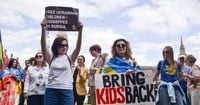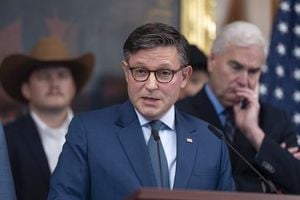In a revelation that has stunned international observers, a new report by Yale University’s Humanitarian Research Lab (HRL) has uncovered the vast scale of Russia’s systematic deportation, re-education, and militarization of Ukrainian children since the onset of the full-scale invasion in February 2022. The findings, published on September 17, 2025, document at least 210 sites across Russia and occupied Ukrainian territories where more than 35,000 Ukrainian children have been transported, many forcibly separated from their families and subjected to intensive programs designed to erase their Ukrainian identity and instill Russian patriotism.
According to the HRL report, titled Ukraine’s Stolen Children: Inside Russia’s Network of Re-Education and Militarization, the scope of Russia’s efforts is even larger than previously estimated. The network, stretching over 3,500 miles from the Black Sea to Siberia, includes summer camps, schools, military bases, medical facilities, religious sites, universities, and even monasteries. Of the 210 sites documented, 156 were newly identified in this latest investigation. About half are directly managed by Russian federal or local authorities, a detail that underscores the program’s official sanctioning and scale.
The HRL’s research, which relied on open-source intelligence, Russian government documents, news reports, and high-resolution satellite imagery, found that 62% of these sites engage in re-education efforts. Children are subjected to lectures on Russian history, required to sing the Russian national anthem, and participate in ceremonies promoting Russian patriotism. But the report’s most chilling findings relate to the 39 facilities—nearly one in five—that operate militarization programs. Here, children as young as eight are given weapons training, taught grenade-throwing, and even participate in drone assembly for the Russian armed forces. Some are put through combat drills and paratrooper training, with tactical medicine courses rounding out a curriculum that seems more suited to military recruits than schoolchildren.
“They’re giving them actual training in grenade throwing and, in one case we know they’re involved in the manufacture of drones,” Nathaniel Raymond, the director of Yale’s Humanitarian Research Lab, told NPR. “Russian authorities are not taking them to paratrooper jump school to make them mall cops at the Cinnabon at Rostov-on-Don. They are in a training pipeline that has tactical scenarios and curricula that lead only to one conclusion.”
Children’s stays at these facilities vary. Some are returned home after a period, while others remain indefinitely. The HRL could not verify whether any of the children who received military training have been conscripted or deployed in active combat, but the infrastructure and intent are clear. “We can see trench works, firing ranges, parade grounds. The only thing we don’t know is whether [Ukrainian children have] already been deployed in battle,” Raymond remarked to The Guardian.
Ukraine’s government has verified at least 19,500 children missing since 2022, but the HRL’s estimate—corroborated by at least five independent sources—puts the number much higher, at over 35,000 as of March 19, 2025. Russia’s Children’s Rights Commissioner, Maria Lvova-Belova, has claimed that Russia “accepted” 700,000 Ukrainian children between February 2022 and July 2023, a figure that far exceeds any independent estimates and raises further questions about the fate of these children. To date, Ukraine has managed to repatriate just 1,605 children, with the help of mediators such as Qatar, South Africa, and the Vatican.
The international response has been swift and damning. In March 2023, the International Criminal Court (ICC) in The Hague issued arrest warrants for Russian President Vladimir Putin and Maria Lvova-Belova, citing war crimes related to the unlawful deportation and illegal transfer of Ukrainian children. The Yale report asserts that Russia’s actions violate both the Geneva Conventions and the United Nations Convention on the Rights of the Child. “This report demands action. Children are always the most vulnerable victims of armed conflict,” said Andriy Yermak, Head of the Office of the President of Ukraine, as reported by Euronews. “Not only have these children undergone trauma and displacement, they have also suffered systemic deportation, illegal adoption, and forced assimilation.”
Russia has repeatedly denied accusations of abduction, insisting that it is rescuing children from frontline dangers and that Western reports exaggerate the numbers. The Kremlin has not commented on the latest Yale findings. However, the HRL’s research leaves little room for ambiguity: satellite imagery reveals expanded facilities, new construction—including at least two new camps under development—and unmistakable evidence of military infrastructure at sites holding Ukrainian children.
Raymond, in conversation with NBC News, emphasized the importance of the report’s geospatial data for ongoing efforts to locate and return the children. “It’s really important that all the people involved in different ways to bring the kids back have the most accurate geospatial information possible, and this is it,” he stated. The study was commissioned at Ukraine’s request, with the hope that a clearer understanding of the network’s size and structure would aid in the eventual return of these children.
The HRL’s work comes at a precarious time for war crimes documentation. The lab’s operations, previously funded through the State Department’s Conflict Observatory program, now rely on private donations after the program’s cancellation. As NPR reported, support from evangelical organizations and the Ukrainian diaspora has extended the lab’s work through January, but its long-term future remains uncertain.
European officials, according to Raymond, have been “horrified” by the scale and detail of the report. Some see it as a turning point, warning that if such a system can be built for Ukrainian children, it could be replicated elsewhere. Ukraine has made the return of its children a non-negotiable part of any future peace deal with Russia, and President Volodymyr Zelenskyy has announced plans to raise the issue at the United Nations General Assembly.
The HRL’s findings have cast a harsh light on the human cost of the war in Ukraine, exposing a deliberate strategy to erase a generation’s identity and, potentially, to prepare them for future conflict. As Russia expands its network of camps and the world reacts with outrage and legal action, the fate of Ukraine’s stolen children remains an urgent and unresolved tragedy.




